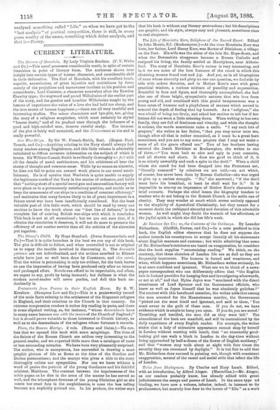The Life of Henrietta Kerr, Religious of the Sacred Heart.
Edited by John Morris, S.J. (Roehampton.)—At the time Henrietta Kerr was born, her father, Lord Henry Kerr, was Rector of Dittisham, a village on the Dart. His wife was the sister of the late Mr. Hope-Scott, and when the Devonshire clergyman became a Roman Catholic and resigned his living, the family settled at Huntlyburn, near Abbots. ford. The story of Henrietta Kerr's career is very interesting, and in it we see some of the best features of the creed in which this charming woman found rest and joy. And yet, as in all biographies of nuns whose sincerity and piety no one can question, we find side by side with ardent devotion, and in Mother Kerr's case with great practical wisdom, a curious mixture of puerility and superstition. Beautiful in face and figure, and thoroughly accomplished, she had also one of those bright, sympathetic natures that win love from young and old, and combined with this genial temperament was a keen sense of humour and a playfulness of manner which served to conceal the depth of feeling that lay baneath. As a "religious," she was afraid of being too lively, and asked her mother to tell her if her letters did not want a little sobering down. When writing to her own family, they are full of freshness and vivacity, and while the thought is serious, the words sometimes raise a smile. "I say such lots of prayers," she writes to her father, " that you may never miss me, though after all that is rather conceited, as I mast ba a great bore sometimes, and you are to say some prayers that I may not make a mess of all the grace offered me." Two of her brothers having entered the Jesuit Novitiate at Roehampton, she writes to one of them,—" You must look so nice and ugly in your cassocks, and all shaven and shorn. It does me good to think of it, it is so utterly unworldly and such a spite to the devil." When a child whom she cared for had been dragged into the Protestant net, "literally ensnared" by relatives we are told,—an act which, of course, has never been done by Roman Catholics—she was urged to give up a useless struggle. "No," she answered ; "if the devil must have his breakfast, at least he shall wait for it." It is impossible to convey an impression of Mother Kerr's character by brief extracts. Perhaps the chief lesson the biography teaches to readers who do not belong to the Romish Church is the noble one of charity. They may wonder at much which seems entirely opposed to the simplicity of Apostolical Christianity, but they cannot for a moment doubt the unfeigned sincerity and devotion of this admirable woman. As well might they doubt the warmth of her affections, or the joyful spirit in which she did her life's work.


































 Previous page
Previous page